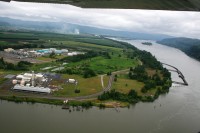On September 18th, the Columbia County Board of Commissioners will hold a public hearing to consider a proposal to rezone nearly 1,000 acres of agricultural land at Port Westward, near Clatskanie, Oregon, to industrial use. The rezone was originally proposed to help facilitate coal exports by converting farmland into industrial land. In June, the planning commission stood up for local farmers and county residents when they voted to deny the rezone application submitted by the Port of St. Helens. Their 5-1 recommendation now must be affirmed or overturned by the three-member Columbia Board of Commissioners.
On September 18th, County Commissioners can decide to heed the recommendation of the Planning Commission and deny the application, or it can sell out local farmers and business by industrializing farmland for big coal and oil. Please join us at the hearing and make your voice heard!
Read Riverkeeper’s legal comments opposing the industrial land grab at Port Westward here.

WHAT: Columbia County Commission meeting to expand Port Westward and make way for dirty coal, oil or other industries at the expense of existing local farms
WHERE: Clatskanie High School (471 Bel Air Dr, Clatskanie, OR)
WHEN: September 18, 6:30PM. Arrive early to sign up to testify.
TESTIFY: Public testimony is allowed! Please testify or submit written comments. You can email written testimony to Jan Greenhalgh: Jan.Greenhalgh@co.columbia.or.us
Please wear red to the hearing to show your opposition to the rezone at Port Westward.
Background:
Adding nearly 1,000 acres of new industrial land at Port Westward is a bad move for Columbia County, especially if it means the return of coal export plans like Kinder Morgan’s and more proposals to export crude oil by train. The Kinder Morgan coal export project would have brought twelve, mile-and-a-half long coal trains (six full, six empty) through Columbia County daily. Trains pose a severe risk to safety and economic development in the county. In the town of Rainer, train tracks run down ‘A’ Street and the downtown core is effectively shut down when trains pass through town. Oil-by-rail also threatens the County’s economic future and livability.
Suggestions for Public Comments to the Columbia County Board of Commissioners:
- The Board of Commissioners should follow the example set by their own Planning Commission, who recommended denial of the rezoning application. The Planning Commission decided that protecting farmland was too important to allow the expansion of the Port’s industrial plans.
- Rezoning farmland for industrial development will increase rail and road traffic. The Port’s application doesn’t hide the ball: it wants to double the size of Port Westward to take advantage of rail access.
- The Port has provided no detailed plans to deal with transportation impacts to Columbia County, particularly from unit train and truck traffic, which would serve the expanded Port Westward site.
- The proposal paves the way for dirty coal export projects. Here are the facts: In January 2012 the Port signed a lease option agreement with Kinder Morgan, promising to find a location for a coal export terminal. Ironically, Portland General Electric, owner of Oregon’s only coal-fired power plant, rejected the first proposed location because coal dust could harm PGE’s natural gas plant at Port Westward. The Port wants to rezone a large section of agricultural land with river access for industrial use. This paves the way for mega coal and oil projects. The Port’s rezoning application states explicitly that potential future uses include coal export and “petroleum based products.”
- Coal dust contains toxic pollution, including arsenic, mercury, and lead. For farmers, landowners, and communities along the rail line, coal dust and diesel emissions are more than a nuisance – they’re a public health issue.
- The County should protect high quality farmland. Many people live in Columbia County because they value living in a rural area and support local farms. The Port’s proposal would eliminate over 600 acres of productive farmland. While the Port likes to talk about “jobs,” this rezone is not about more jobs: the Port’s own application acknowledges the type of development it wants to attract is not labor intensive.
- The majority of the existing Port Westward site is open for development—use it first. Why pave over productive farmland when the majority of the existing Port Westward site is empty?
For more information, contact Dan Serres at dan@columbiariverkeeper.org.


